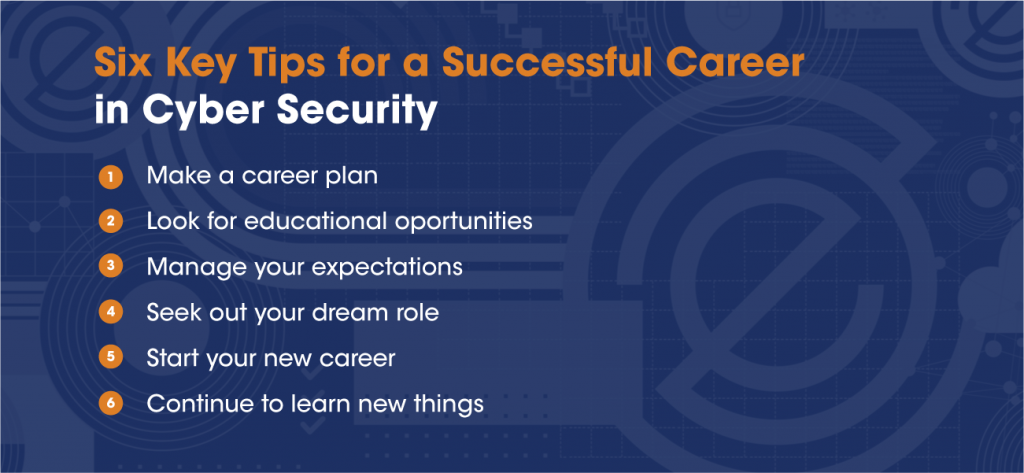Tips to Build a Successful Cyber Security Career
The cyber security market in Australia has grown exponentially in recent years. With a report from AustCyber predicting that there will be around $8 billion spent on cyber security from local and international providers and another 7,000 additional jobs in cyber security by 2024, there is plenty of opportunities to create a diverse and rewarding career in cyber security.
If you’re looking for your next big career move, below are my top tips for building a successful cyber security career that aligns with your needs and goals.
1. Create a Career Plan
The old saying “failure to plan is a plan to fail” is true for your cyber security career. If you are looking to work in cyber security, I believe a plan is integral to your success. This will help direct the education pathway to go down and help you make sure that the effort, education and development you put in are helping you to progress in your career plan.
Having a plan in place gives you a rough guide of where you want your career to go so you can see tangible results as you progress.
2. Seek Out Opportunities for Education
To start in any industry, there is generally an expectation that you have a base level of knowledge around the subject, work and required outcomes before starting in the field, and cyber security is no different.
You should develop skills in one or more key areas of cyber security – the best education pathway to pursue will depend on the area of the industry you are planning to work in.
As an example, positions focused on offensive cyber security typically require certification in an offensive tool. Alternatively, another option is the application of doing offensive security qualifications such as an Offensive Security Certified Professional (OSCP) certificate. In more consulting, strategic-style cyber roles (GRC), an education pathway is typically through university and then into methodology/framework-specific training.
3. Have Reasonable Expectations
Your previous background before entering a professional cyber field can influence where you start.
I know the media and rumours of high salaries, an unlimited number of jobs and the stability of a career in cyber are compelling, and they are also somewhat true. However, I do find that reality vs expectations of people entering or changing fields in cyber security can differ.
My advice is to seek the opinion or support of someone in a role where they can be honest and helpful, such as a recruitment specialist or a cyber security hiring manager. They will be able to give you an honest opinion of the industry and talk you through your expectations of working within it. You can also ask the opinion of a senior industry peer. Cyber security is a very inclusive and supportive industry, and I find that senior and experienced security folk enjoy helping, guiding and supporting people who are new or looking to join the industry.
4. Start Looking for Opportunities
Once you have done your research and achieved the required education, it’s time to start looking for a professional role. Finding a starting point is typically the hardest part, as it’s competitive for entry-level roles in cyber security.
There are generally high expectations to start (education, certificates, and background knowledge of technology) and this is where being persistent, not letting the process deter you and building a network by attending seminars, events and meeting people at local get-togethers can be invaluable.
I also strongly believe partnering with a cyber security recruitment agency will open more opportunities for you to consider as well.
5. Begin Your Career
Congratulations, you have landed your first role in cyber security! Now that you’ve achieved this milestone, it’s time to review the career plan that you wrote earlier and make any changes that you may need to.
Now that you have more experience in the cyber field, you have networked, learned, experienced and “been around”, you may decide to adjust your career plan to keep it aligned with your goals.
The development of new skills and experience will boost your employment options. Again, having sound advice from qualified people as well as trusting your judgement, following your career plan and being self-aware of WHY you do what you do on a professional level are important.
6. Never Stop Learning
In a world where technology is changing almost daily, it is paramount that you keep up to speed with trends, products, methodologies and frameworks in cyber. The most in-demand people I find are the ones who have always studied, learned and developed as the industry progresses. A general rule of thumb I see cyber professionals apply is to make sure they do one training course every six months and attend two major industry seminars a year.

Summary
The cyber security world is a wonderful place to be right now with all the projected growth in the Technology and Digital recruitment sector in Australia in the next few years. For more information on how you can get started in cyber security, contact us today. We can help to guide you through your career planning and get you on the right path to career satisfaction.






